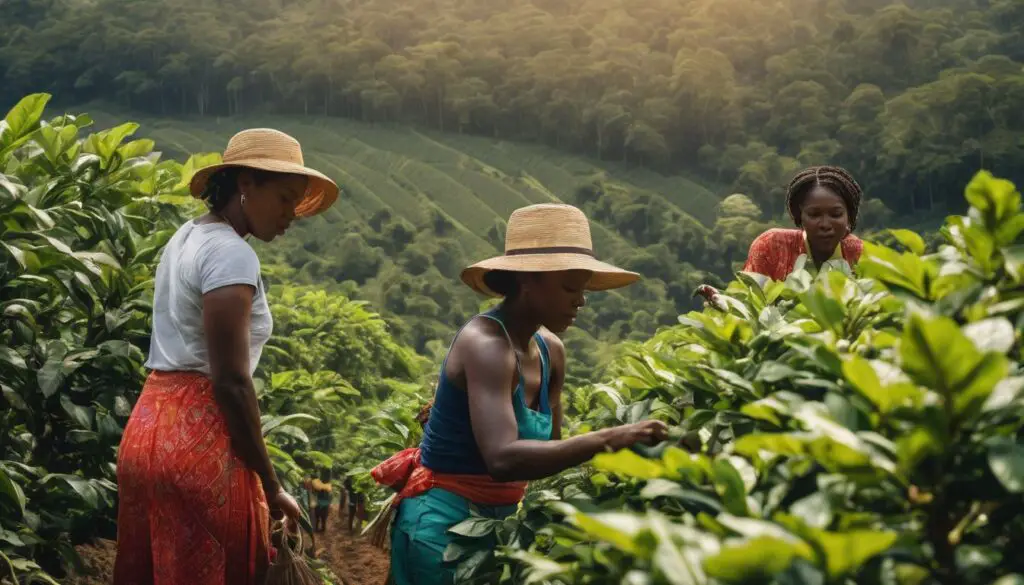Coffee is savored around the world, but few understand the stark gender inequality in green coffee production. The coffee industry, from bean to cup, tends to be male-dominated with women earning significantly less.
This article will shed light on this issue and discuss initiatives promoting gender equality in green coffee production. Intrigued? Let’s dive into this unexplored side of your daily brew!
Key Takeaways
- Green coffee production is a male-dominated industry with significant gender inequalities in access to resources and decision-making positions.
- Women in green coffee production face income and structural disadvantages, earning less than men due to limited access to land ownership, finance, and knowledge about coffee production.
- Gender equality in coffee production is important for economic benefits, social empowerment, and sustainable development. Closing the gender gap can lead to increased productivity, higher household incomes, and thriving communities.
- Initiatives promoting gender equality include women-owned roasters and businesses, training programs for technical skills and business management, as well as certification programs like Fair Trade Certification that ensure fair labor conditions and promote equal opportunities for women.
[ez-toc]
Gender Inequality in Green Coffee Production
The green coffee production industry is predominantly male-dominated, with significant gender disparities in access to resources and decision-making positions.
Women in the industry face challenges in competing with their male counterparts, and there is a need for greater gender equality and inclusivity in the sector.
Male-Dominated Industry
Men rule the coffee making world. More men hold high jobs and earn more money in this field. This is not fair to women who work just as hard. Women often do not have the same rights or tools to do their job.
It’s time for a change in this industry. All people deserve equal chances, no matter if they are a man or woman. Fairness is crucial in creating a level playing field for everyone, especially for those who are entering the industry for the first time.
Gender Disparities in Access to Resources and Decision-Making
Women in green coffee production face significant gender disparities when it comes to accessing resources and participating in decision-making processes at the farm level. Studies have shown that women often have limited access to land, finance, and knowledge about coffee production.
They also have less influence and decision-making power within the industry. This inequality is rooted in social biases and structural disadvantages faced by women, which can hinder their social independence. As a result, women are at a disadvantage when it comes to earning income from coffee production and trading.
Addressing these disparities is essential for achieving gender equality in the industry and promoting sustainable development. The International Coffee Organization recognizes the importance of addressing these issues and has implemented initiatives to support women in coffee-producing communities.
Income and Structural Disadvantages for Women
Women in green coffee production face significant income and structural disadvantages. Research has shown that there is a gender gap in the income earned from coffee production and trading, with women earning less than men.
This disparity can be attributed to various structural disadvantages faced by women in the industry. Women often have limited access to land ownership, decision-making power, finance, and knowledge about coffee production.
These barriers prevent them from fully participating in and benefiting from the industry. Addressing the role of women in green coffee production is crucial for achieving gender equality and ensuring equal opportunities for women and future generations.
The Importance of Gender Equality in Coffee Production
Gender equality in coffee production is crucial for not only economic benefits but also social empowerment and sustainable development. The United Nations recognizes the importance of gender equality in the coffee industry and has launched initiatives to promote it.
The Specialty Coffee Association also advocates for gender equity in the coffee supply chain, recognizing the significant contributions of women in coffee farming and processing.
Economic Benefits
Improving gender equality in green coffee production in Africa can have significant economic benefits. When women have equal access to resources and decision-making power, they can contribute more effectively to the industry.
Additionally, closing the gender gap can lead to increased productivity and profitability for coffee businesses in Honduras. Studies show that when women are empowered in coffee production, household incomes rise and communities thrive, improving their livelihoods.
By supporting initiatives that promote gender equality and sustainable harvest, we not only create a fairer industry but also stimulate sustainable economic growth in Brazil and the developing world.

Social Empowerment
Gender equality in green coffee production is not just about economic benefits; it also plays a crucial role in social empowerment. When women are given equal opportunities and rights in the industry, they gain more control over their lives and communities.
By bridging the gender gap in coffee production, we can empower female farmers to have a voice in decision-making processes and access essential resources. This fosters inclusivity and creates a more sustainable future for everyone involved.
Initiatives like promoting women-owned roasters and capacity-building programs are working towards empowering women in coffee production, ensuring that they have the knowledge, skills, and support to thrive.
Sustainable Development
Sustainable development is a crucial aspect of gender equality in green coffee production. When we talk about sustainable development, we are focusing on the long-term well-being of people and the environment.
In the context of coffee production, this means ensuring that women have equal opportunities to participate and benefit from the industry. By promoting gender equality, we can create a more inclusive and resilient coffee supply chain.
This not only benefits women by empowering them economically and socially but also contributes to the overall sustainability of coffee farming communities. Gender equity in green coffee production is an ongoing process that requires continuous efforts to bridge the gap and ensure a more just and sustainable future for all stakeholders involved.
Initiatives Promoting Gender Equality in Coffee
Women-owned roasters and coffee businesses are working to promote gender equality in the coffee industry. Training and capacity-building programs, as well as certification programs, are also helping to empower women in green coffee production.
Read more about these initiatives and their impact on achieving gender parity in coffee at [insert blog URL here].
Women-Owned Roasters and Coffee Businesses
Women-owned roasters and coffee businesses are playing a crucial role in promoting gender equality in the green coffee production industry. They are actively working to address the gender disparities that exist in this male-dominated field. These initiatives provide opportunities for women to participate in all stages of the coffee supply chain, from farming to trading. By supporting women-owned businesses, consumers can contribute to the empowerment and economic advancement of women in the coffee industry. Some notable women-owned roasters include:
- La Colombe Coffee Roasters
- Cafe Grumpy
- Red Bay Coffee
- Equator Coffees
Training and Capacity-Building Programs
Training and capacity-building programs are important initiatives that aim to address the gender disparities in green coffee production. These programs provide women with the skills, knowledge, and resources they need to succeed in the industry. They focus on:
- Providing technical training on coffee cultivation, harvesting, processing, and quality control.
- Offering business management skills to help women effectively manage their own coffee farms or businesses.
- Creating networking opportunities for women to connect with other professionals in the industry.
- Promoting financial literacy and access to credit so that women can invest in their coffee farms or businesses.
- Encouraging leadership development and providing mentorship opportunities for women in green coffee production.
- Empowering women by fostering a supportive and inclusive learning environment.
Certification Programs
Certification programs play a crucial role in promoting gender equality in green coffee production. These programs ensure that coffee farmers meet specific standards, which can lead to better opportunities for women. Some important certification programs include:
- Fair Trade Certification: This program ensures that coffee is produced under fair labor conditions and guarantees a fair price to farmers. It helps empower women by providing them with access to training, resources, and education.
- Organic Certification: By certifying coffee as organic, these programs promote sustainable farming practices that benefit both the environment and the farmers. Women are encouraged to participate in organic coffee production, providing them with economic opportunities and protecting their health.
- Rainforest Alliance Certification: This program addresses social, economic, and environmental sustainability in coffee production. It supports initiatives that promote gender equality and empowerment, such as women’s leadership training and access to credit.
- Utz Certification: Utz certified farms follow strict social and environmental standards, including promoting gender equity in decision-making processes. This program encourages equal participation of women in farm management and ensures fair treatment for all workers.
- 4C Association Certification: The 4C Association focuses on improving social conditions for coffee farmers worldwide. Their certification program works towards ensuring gender equality by providing resources and support specifically targeted at reducing discrimination against women.
Frequently Asked Questions
Why Is Gender Equality Important in Green Coffee Production?
What Are Some Examples of Gender Inequalities in Green Coffee Production?
How Can Gender Equality Be Promoted in Green Coffee Production?
What Benefits Can Come from Achieving Gender Equality in Green Coffee Production?
Final Thoughts
In conclusion, gender equality in green coffee production is crucial for a fair and sustainable industry. The current gender disparities in access to resources and decision-making must be addressed.
By promoting inclusivity and supporting initiatives that empower women, we can create a more equitable coffee supply chain that benefits everyone involved. Together, let’s work towards achieving gender parity in coffee production for a better future.

